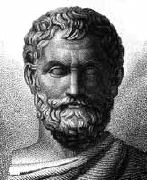

Thales seems to be the first known Greek philosopher, scientist, and mathematician, although his occupation was that of an engineer. He is believed to have been the teacher of Anaximander, and he was the first natural philosopher in the Milesian School. However, none of his writing survives
so it is difficult to be certain about his mathematical discoveries. Indeed it is unclear whether he wrote any works at all. Certainly Thales was a figure of enormous prestige, being the only philosopher before Socrates to be among the Seven Sages.
It is reported that Thales predicted an eclipse of the Sun in 585 BC. The cycle of about 19 years for eclipses of the Moon was well known at this time but the cycle for eclipses of the Sun was harder to spot since eclipses were visible at different places on Earth. Thales's prediction of the 585 BC eclipse was probably a guess based on the knowledge that an eclipse around that time was possible.
There are several accounts of how Thales measured the height of pyramids.
Thales discovered how to obtain the height of pyramids by measuring the shadow of the pyramids at the time when any body's height and its shadow are equal in length. But
Plutarch credits him with understanding similar triangles.
It is thought that Thales put geometry on a logical footing and was well aware of the notion of proving a geometrical theorem. Thales is credited with five theorems of elementary geometry:
A circle is bisected by any diameter, the base angles of an isosceles triangle are equal, the angles between two intersecting straight lines are equal, two triangles are congruent if they have two angles and one side equal, and an angle in a semicircle is a right angle.
Our knowledge of the philosophy of Thales is due to Aristotle.
It was Thales who first conceived the principle of explaining the multitude of phenomena by a small number of hypotheses for all the various manifestations of matter.
Thales believed that the Earth floats on water, and explained earthquakes this way. The importance of Thales' ideas is that he is the first recorded
person who tried to explain such phenomena by rational rather than by supernatural means.